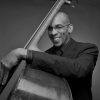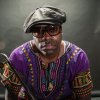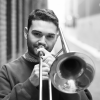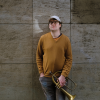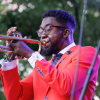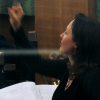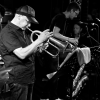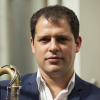Home » Jazz Musicians » Freddie Hubbard
Freddie Hubbard
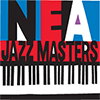
Frederick Dewayne Hubbard (born April 7, 1938 in Indianapolis, Indiana) is an American jazz trumpeter.
In his youth, Hubbard associated with various musicians in Indianapolis, including Wes Montgomery and Montgomery's brothers. Chet Baker was an early influence, although Hubbard soon aligned himself with the approach of Clifford Brown (and his forebears: Fats Navarro and Dizzy Gillespie).
Hubbard's jazz career began in earnest after moving to New York City in 1958. While there, he worked with Sonny Rollins, Slide Hampton, J. J. Johnson, Philly Joe Jones, Oliver Nelson, and Quincy Jones, among others. He gained attention while playing with the seminal hard bop ensemble Art Blakey and the Jazz Messengers, appearing on such albums as Mosaic, Buhaina's Delight, and Free For All. He left the Messengers in 1964 to lead his own groups and since that time has maintained a high profile as a bandleader or featured as a special guest, but never merely a sideman.
Along with two other trumpeters also born in 1938, Lee Morgan (d. 1971) and Booker Little (d. 1961), Hubbard exerted a strong force on the direction of 1960s jazz. He recorded extensively for Blue Note Records: eight albums as a bandleader, and twenty-eight as a sideman. [1] Most of these recordings are regarded as classics. Hubbard appeared on a few early avant-garde landmarks (Ornette Coleman's Free Jazz, Eric Dolphy's Out to Lunch and John Coltrane's Ascension), but Hubbard never fully embraced free jazz, though it has influenced his playing.
After leaving Blue Note, Hubbard recorded for the Atlantic label and moved toward a more commercial style. His next label was CTI Records where he recorded his best-known works, Red Clay, First Light, and Sky Dive. By 1970, his fiery, melodic improvisation and phenomenal technique established him as perhaps the leading trumpeter of his day, but a series of commercially oriented smooth jazz albums spawned some negative criticism. After signing with Columbia Records, Hubbard's albums were almost exclusively in a commercial vein. However, in 1976, Hubbard toured and recorded with V.S.O.P., led by Herbie Hancock which presented unadulterated jazz in the style of the 1960s Miles Davis Quintet (with Hubbard taking the place of Davis).
1980s projects moved between straight-ahead and commercial styles, and Hubbard recorded for several different labels including Atlantic, Pablo, Fantasy, Elektra/Musician, and the revived Blue Note label. The slightly younger Woody Shaw was Hubbard's main jazz competitor during the 1970s and 1980s, and the two eventually recorded together on three occasions. Hubbard participated in the short-lived Griffith Park Collective, which also included Joe Henderson, Chick Corea, Stanley Clarke, and Lenny White.
Read moreTags
Ornette Coleman: Free Jazz to Ornette! Revisited

by Alberto Bazzurro
Che cosa si può dire ancora di un'opera che ha stravolto il corso del jazz, uno di quegli snodi dopo i quali--qui fin dal titolo--nulla può essere più come prima? Punti di svolta decisivi e ineludibili che cambiano il corso di un'arte, pietre miliari come Les Demoiselles d'Avignon in pittura, l'Ulysses di Joyce in letteratura, o più specificatamente in poesia Un coup de dés di Mallarmé? Nulla, appunto, perché tutto dev'essere per forza di cose già stato detto e scritto, ...
Continue ReadingOrnette Coleman: Free Jazz To Ornette! Revisited

by John Eyles
For ezz-thetics' revisited series' fourth Ornette Coleman album, the label has ventured back further than any of its previous Coleman albums, to New York City in December 1960 and January 1961. Recorded at A&R Studios on Wednesday December 21st 1960 from 8pm to 12.30am, the Free Jazz session produced two pieces, the thirty-seven minute “Free Jazz" itself, which was issued in September 1961 on an Atlantic album entitled Free Jazz: A Collective Improvisation By The Ornette Coleman Double Quartet, and ...
Continue ReadingCTI Acid Jazz Grooves by Various Artists

by Arnaldo DeSouteiro
The CD you are holding in your hands is a very special compilation. It's the celebration of CTI as one of the most “sampled" labels on Earth! For the past ten years, many CTI tracks have been cut up, sampled, scratched and looped to create new songs for a new audience. Many of the selections on this album (all of them produced by Creed Taylor and engineered by Rudy Van Gelder) represented the basic inspiration and major influence in the ...
Continue ReadingEric Dolphy: Outward Bound To Out To Lunch Revisited

by Stefano Merighi
Il valore incalcolabile dell'opera di Eric Dolphy sta passando un po' in secondo piano nel nostro tempo di ascolti rapidi e deconcentrati. Ben venga allora questa edizione, anche se rimane la perplessità dell'accorpare due dischi che pochissimo hanno in comune e che sono comunque ancora a disposizione negli ottimi originali. Dal 1960 al 1964 (anno della scomparsa), Dolphy ha attraversato un mondo sonoro denso, sfaccettato, rimanendo se stesso sia accanto a Mingus che a Russell, sia nelle sabbie ...
Continue ReadingAlan Shorter: Mephistopholes To Orgasm Revisited

by Chris May
It is often said of a musician, be they alive or no longer with us, that they deserve to be better known. This is emphatically true of the wayward trumpeter and composer Alan Shorter, who was overshadowed during his lifetime by his brother, Wayne Shorter, and who continues to be passed over today in 2024. Some responsibility for his obscurity lies with Alan Shorter himself. Known as Doc Strange to his teenage schoolmates in Newark, New Jersey, ...
Continue ReadingFreddie Hubbard: One Of A Kind

by Richard J Salvucci
It is something of a challenge to review Freddie Hubbard's work from the early 1980s. He had changed direction in the early 1970s with Red Clay (CTI, 1970) moving toward soul-jazz and jazz-rock, although anyone listening to Hubbard's playing would hear his standard vocabulary of licks. Some listeners approved; some listeners did not; and some simply labelled him a sell-out. This certainly was not the Hubbard of Blue Note, and while he returned to playing straight ahead in the mid-1980s ...
Continue ReadingFreddie Hubbard at the Jazz Cafe in London

by Rob Hancock
I love the sound of the trumpet and flugelhorn, above all else in jazz. Hey day players like Miles, Morgan, Dorham and Gillespie are some of my favourites, but no one has left a bigger mark on my ears than Freddie Hubbard. Whether it be his firing early 60's works with the Messengers, his countless Blue Note dates or his super funky contribution to the CTI catalogue, it's all great. Freddie was one of the few trumpet players to have ...
Continue ReadingFreddie Hubbard: Complete Blue Note & Impulse

Source:
JazzWax by Marc Myers
Even if you own all 10 of the Freddie Hubbard albums covered on The Complete Freddie Hubbard Blue Note & Impulse '60s Studio Sessions, the newly released seven-CD set from Mosaic Records, this box is a must. The albums in the box were recorded between 1960 and 1967. First, the box's sound is fantastic. It's much warmer and dimensional than previous issues, and the individual instruments are more vivid and distinct, with a broader and more colorful tonal impact. The ...
read more
Freddie Hubbard: Three Videos

Source:
JazzWax by Marc Myers
Trumpeter Freddie Hubbard came up at the height of the hard bop movement in the late 1950s and became instrumental in free jazz movement in the 1960s and fusion in the '70s. His second recording was on John Coltrane's The Believer in late 1958, and from then on Hubbard was in strong demand. His critical recordings in the 1960s include Ornette Coleman's Double Quartet, Oliver Nelson's The Blues and the Abstract Truth, Dexter Gordon's Doin' Allright, Coltrane's Africa Brass, Herbie ...
read more
Universal Music Opens Vaults To Launch uDiscover Online Store

Source:
HypeBot
Catalog sales contribute a great deal to the bottom line of most labels, and online commerce provides a unique opportunity to leverage the long tale of fan interest well after mainstream media stops caring. Sony Legacy is a prime example. Now, Universal Music is mining its massive vaults and selling some real treasures. Universal Music Enterprises has launched a new online store, uDiscoverMusic, aimed at leveraging its historical assets as a new revenue stream. The uDiscover store allows fans to ...
read more
Freddie Hubbard - Pinnacle: Live and Unreleased (2011)

Source:
Something Else!
The late Freddie Hubbard, whose brilliant technique and warm tone were occasionally obscured by unfortunate settings, is perhaps to blame for his own dimmed star. Recordings like this make his case all over again. Punchy and full of solos that are both demonstrative and then incendiary, Pinnacle: Live and Unreleased was recorded in June and October of 1980 at San Francisco's Keystone Korner with a backing group that included bassist Larry Klein (now Joni Mitchell's producer) and pianist Billy Childs, ...
read more
Freddie Hubbard - Pinnacle; Live and Unreleased from Keystone Korner (Resonance, 2011)

Source:
Music and More by Tim Niland
Trumpeter Freddie Hubbard was one of the leading lights of the hard-bop movement in the sixties, leading several albums of his own for Blue Note Records, while participating in sessions as wide ranging as Ornette Coleman's Free Jazz and John Coltrane's Ascension. Hubbard had become something of a journeyman by 1980 when this concert was recorded; he had recorded some pop-jazz for Atlantic in the 70's and would soon develop severe lip problems that would curtail the remainder of his ...
read more
Announcing the Winners of the "Freddie Hubbard - Pinnacle: Live and Unreleased from Keystone Korner" Giveaway

Source:
All About Jazz
Enter the "Freddie Hubbard - Pinnacle: Live & Unreleased from Keystone Korner" Giveaway

Source:
John Kelman
Album Review: Pinnacle by Freddie Hubbard

Source:
Groove Notes
The end of 2008 was a tough time for me as it related to jazz, primarily because the jazz world lost Freddie Hubbard due to complications from a heart attack right before 2009. As a trumpet player myself, Hubbard was my biggest influence, but he also struck me as a “survivor." Both Clifford Brown and Lee Morgan were lost before their time, and Freddie tore through the 70's with mind-blowing recordings (both live and studio) when jazz needed a trumpeter ...
read more
The Legacy of Freddie Hubbard

Source:
The Independent Ear by Willard Jenkins
The attitude pendulum towards creative artists most often swings most heavily-- as it should--to the enormity of their gifts with the passage of time for those whose careers were marked by questionable behavior. Our collective memory tends to soften towards those guilty of even the most egregious behavioral lapses after they've passed on to ancestry, and as time allows us the opportunity to ponder what they left here for us to learn; their respective human frailties are dealt with a ...
read more
Freddie Hubbard 'Jazz Wave' Performances Unearthed

Source:
Billboard Magazine
For his first posthumous release, famed jazz trumpeter Freddie Hubbard will resurface on June 2 with “Without a Song: Live In Europe 1969." Hubbard, who died last December at age 70, will join the ranks of Charles Mingus, Thelonious Monk with John Coltrane, and Horace Silver in a recent series of live releases from Blue Note. For “Without a Song," Grammy award winning producer Michael Cuscana was tapped for production duties. The seven song set culls from the “Jazz Wave" ...
read more





.jpg)

























